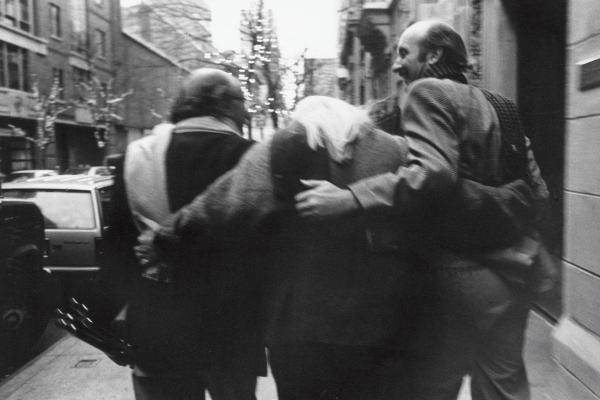The folk trio Peter, Paul, and Mary had almost 50 years together until Mary Travers’ death in 2009. Peter Yarrow and Noel Paul Stookey continue as musicians and activists, and have reflected on their experiences in a new a photo-filled book Peter, Paul and Mary: 50 Years in Life and Song (Imagine/Charlesbridge). A just-released album, DISCOVERED: Live in Concert, includes 12 live songs never before heard on their albums. And on Dec. 1 (check local listings), PBS will air 50 Years with Peter, Paul and Mary — a new documentary with rare and previously unseen television footage and many of the trio’s best performances and most popular songs.
I spoke with Yarrow and Stookey this week about music, movements, and the spiritual aspects of both. (Stookey had what he describes as a “deep reborn experience” as a Christian around 1969 or 1970; Yarrow doesn’t affiliate with a specific religious institution, but describes much of what motivates him in spiritual terms.)
Stookey describes how all three of them were drawn to carrying on the precedent of folk forebears such as Woody Guthrie and Pete Seeger to make music “in the interest of, and love of, community.” Their appearance at the 1963 March on Washington was, he says, “the galvanizing moment” for their activism, the beginning of a trajectory that would engage them in the civil rights, peace, anti-nuclear, environment, and immigration movements, and “less media-covered causes and events — a rainbow of concerns that we were inevitably and naturally drawn into.”
Peter, Paul, and Mary became involved in protesting U.S. involvement in Central America in the early ‘80s, which, says Stookey, “was all spawned by an article in Sojourners. My song [“El Salvador,” 1982] was almost a literal rendering, lyrically, from the articles written in Sojourners magazine about what was happening in Nicaragua and El Salvador; I just happened to have the right melody at the right time for it.”
Just like Poland is 'protected' by her Russian friends
The junta is 'assisted' by Americans
And if 60 million dollars seems too much to spend
in El Salvador
They say for half a billion they could do it right
Bomb all day, burn all night
Until there's not a living thing upright
in El Salvador
[Written by Noel Paul Stookey and Jim Wallis, © 1983 Neworld Media Music (ASCAP)]
After Stookey wrote the song, the trio decided to visit El Salvador and Nicaragua to see conditions for themselves. Yarrow describes the experience:
What happened to us was explosive when we went to El Salvador — coming to terms with the fact that in the most concrete and personal of ways the U.S. was doing things in both El Salvador and Nicaragua that were contrary to everything we believed that America should be. In El Salvador we went to a church where we sang “Blowin’ in the Wind,” where people had lived for months [because] if they went outside they would potentially be captured by the police and disappeared or found in the streets, dead. The U.S. was supporting the government that was doing this. And you know, of course, about the Maryknoll nuns and Oscar Romero who were killed. Here was this extraordinarily holy place, filled with the biggest hearts and most loving with people, that was living under a dictatorial heel. The U.S. was pouring money into El Salvador’s government and for that reason the U.S. did not accept people who could leave El Salvador and come to the U.S. seeking sanctuary. So we took the song “El Salvador” and made it a single and sold it to raise money for the Sanctuary movement when we came back.
The trio had similar experiences in Nicaragua, seeing the death and devastation caused by U.S.-funded Contra forces. Yarrow says that Mary wrote a poem about the visit to one community and hearing the stories of family lost to the violence; he adapted one of her images into lyrics for the song “Take the Chance,” which he recites:
Now on a hill there stands a cross above a graveyard
And the simple word carved in it says "forgive"
No war or killing anger can match the force it carries
It can heal the generations so that other ones can live
[Written by Peter Yarrow, Lyrics © Warner/Chappell Music, Inc.]
“It was devastating to us,” Yarrow says. But, he continues, “having that kind of experience transforms the person into deeper commitment and more love. You have one of only two choices: You either dismiss it and say ‘that has nothing to do with me.’ Or you embrace it, and in order to embrace it you have to have some sort of internal transformation that allows you to become a part of the imperative of building peace and building love in any ways that you can.”
Recently, both Yarrow and Stookey have been involved in the immigration rights movement, and visited the tent for participants in the Fast for Families: A Call for Immigration Reform and Citizenship in D.C. last fall. Noel Paul Stookey has written a song on the topic called “Familia Del Corazon” — video of him performing it in June with Gina Chavez & Los Texmaniacs can be found here.
While some longtime activists are touched by weariness and cynicism, bothYarrow and Stookey communicate an undiminished belief in the power of music — songs sung together in living rooms, at mass marches, and in acts of civil disobedience — to break down barriers, create community, and inspire social change.
As Stookey notes, “Folk music, as Mary used to say, requires you to live it if you’re going to sing it.”
Julie Polter is Senior Associate Editor for Sojourners magazine.
Got something to say about what you're reading? We value your feedback!
